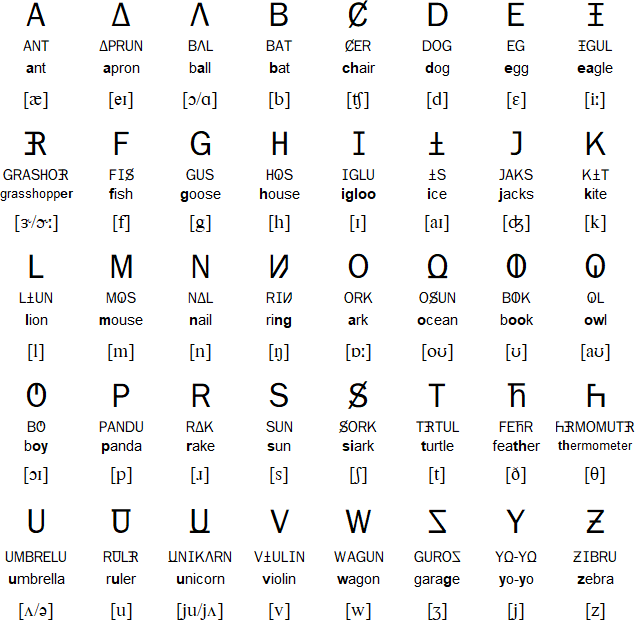The Unifon alphabet is an alternative way of writing English based on the principle of one letter per phoneme. The name means "one sound". It was created by John Malone in the 1950s when he was working for the Bendix Corporation. He was assigned the task of creating an international phonetic alphabet for use with the airlines. This came to nothing as the airlines adopted English as their standard language.
Unifon was later found to be useful as a transitory alphabet to help children to learn to read English. Once they became proficient with Unifon, they would be introduced to the regular English alphabet and all the irregular spellings. Unifon could also be used as a pronunciation key in English dictionaries. Unifon has few supporters and is not widely used.
In the 1970s and 1980s, Tom Parsons (1930-2018), the director of Humboldt State University's Community Development Center, developed ways to write the Native American languages of northern California, Hupa, Yurok, Tolowa and Karuk, with Unifon. A number of books were published in these languages using Unifon, however after Tom Parsons left the university, the use of Unifon for them fizzled out.

Download an alphabet chart for Unifon (Excel)

All human beings are born free and equal in dignity and rights. They are endowed with reason and conscience and should act towards one another in a spirit of brotherhood.
(Article 1 of the Universal Declaration of Human Rights)
Information about the Unifon alphabet
https://en.wikipedia.org/wiki/Unifon
http://www.unifon.org
Unifon fonts
https://www.unifon.org/pages/fonts-for-unifon.html
The Unifon Alphabet Reader - Original Stories by Neil Stewart
http://www.dlstewart.com/neil/
Unifon fonts
https://www.unifon.org/pages/fonts-for-unifon.html
Constructed scripts for: Ainu | Arabic | Chinese languages | Dutch | English | Hawaiian | Hungarian | Japanese | Korean | Lingala | Malay & Indonesian | Persian | Tagalog / Filipino | Russian | Sanskrit | Spanish | Taino | Turkish | Vietnamese | Welsh | Other natural languages | Colour-based scripts | Tactile scripts | Phonetic/universal scripts | Constructed scripts for constructed languages | Adaptations of existing alphabets | Fictional alphabets | Magical alphabets | A-Z index | How to submit a constructed script
[top]
You can support this site by Buying Me A Coffee, and if you like what you see on this page, you can use the buttons below to share it with people you know.

If you like this site and find it useful, you can support it by making a donation via PayPal or Patreon, or by contributing in other ways. Omniglot is how I make my living.
Note: all links on this site to Amazon.com, Amazon.co.uk
and Amazon.fr
are affiliate links. This means I earn a commission if you click on any of them and buy something. So by clicking on these links you can help to support this site.
[top]